新探索研究生英语(提高级)视听说教程U3课件
新视野视听说(第三版)B1U3课件
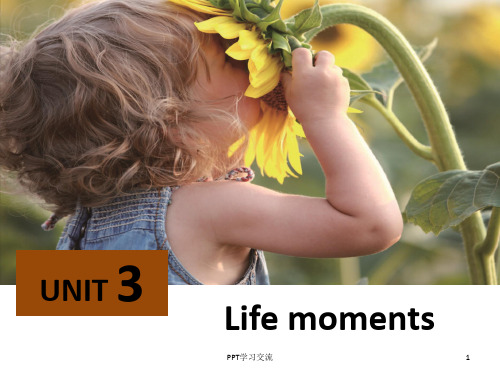
PPT学习交流
9
Listening to the world
Sharing
4 Watch Part 3 and fill in the blanks.
1) exciting 2) amazing concert 3) incredible 4) the theater 5) the best place 6) different
something new to experience.
3 What question does he ask people to answer?
How do you feel about LoPnPdT学o习n交?流
7
Listening to the world
Sharing
3 Watch Part 2 and match the statements.
1. Prepositional phrases with in, on, at, from ... to, by, for plus time are very common phrases of time order: • in March; in 2008; in the rainy season; in the morning / afternoon / evening; in the early 1940s • at Christmas; at Thanksgiving; at the end of the year; at the beginning of class • from Monday to Friday; from 2012 to 2014; from 5 o’clock to 9 o’clock • by the fifth day; by next weekend; by the end of last year • for about 10 minutes; for three hours; for more than two days
第三版新视野大学英语3视听说教程.pptx
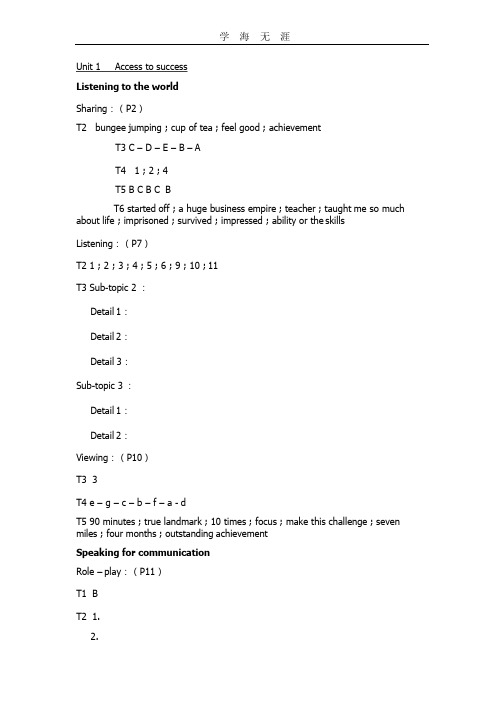
Viewing:(P76)
学海无涯
T2 A B C T3 1.
2. 3. 4. 5. Speaking for communication Role – play:(P77) T3 1. 2. 3. 4. 5. 6.
1. 2. 3. 4. 5. 6. Group discussion:(P79) T1 T2 T3 Public speaking:(P84) T3 T4 Further practice in listening(P85) Short conversations: D B C A D Long conversation:B C D B
2. leave us feeling angry 3. in a controlled way 4. feel much better 5. laughter therapy ; they make them laugh ; doing something funny 6. they don't need medicine T4 1 ; 4 Viewing:(P30) T2 1.eager ; pleased 2.nervous ; awkward 3.expectant ; excited 4.agitated ; contented T3 1. 2. 3. 4. 5. Speaking for communication Role – play:(P32) T1
学海无涯
Unit 1 Access to success Listening to the world Sharing:(P2) T2 bungee jumping ; cup of tea ; feel good ; achievement
T3 C – D – E – B – A T4 1 ; 2 ; 4 T5 B C B C B T6 started off ; a huge business empire ; teacher ; taught me so much about life ; imprisoned ; survived ; impressed ; ability or the skills Listening:(P7) T2 1 ; 2 ; 3 ; 4 ; 5 ; 6 ; 9 ; 10 ; 11 T3 Sub-topic 2 : Detail 1: Detail 2: Detail 3: Sub-topic 3 :
新探索研究生英语(提高级)unit1passage2

新探索研究生英语(提高级)unit1passage2Directions:Water scarcity【不足;缺乏】is becoming an increasingly serious problem in many countries. According to the UN World Water Development Report 2020, 2.2 billion people around the world do not have access to safely managed drinking water. 【全世界22亿人没有办法获得安全管理的饮用水】What can people do to solve water shortage problems? Read the text and find out how vegetarianism, desalination【海水淡化】, cloud seeding【云中散播(促进降雨的技术)】, and reducing water consumption in manufacturing sector might relate to solving the problem.Thirstier than ever1 Water covers approximately 75% of the Earth's surface, yet only 3% of it is drinkable; the rest is salt water. Of the little that isglaciers. According to Kummu et al. (2010), roughly a third of the world's population is at risk from water scarcity, and population growth is only exacerbating the issue【世界上约有三分之一的人缺水,人口增长只会加速这一问题】. Not only does our species need water to survive, we also rely heavily on it to water our crops【农作物crop的复数】and sustain our livestock—people typically drink around five liters【公升】 of water per day, while agriculture accounts for【占……比例】the majority of global fresh water consumption. In some parts of the world, water scarcity severely 【非常严重地;严厉地】limits food production capabilities. Coumou and Rahmstorf (2012) have also forecast that climate change will increase precipitation variability【降水量变率】 (i.e. the frequency of rain), raising the risk of flooding and drought that blight food production. So, what solutions are available to ensure a consistent and stable fresh water supply?2 The agricultural sector accounts for approximately 70% of global fresh water consumption—double that of industrial and domestic use combined. While more efficient irrigation practices could reduce this volume by an estimated 30%–70%, cutting consumption of animal products【动物制品】for【为了】less water-intensive crops would also have a perhaps unexpectedly significant impact. Some people advocate【提倡】 a switch to a vegetarian or vegan diet on the basis that【在此基础上】the production of meat is much more water-intensive than the production of grains and vegetables. Mekonnen and Hoekstra (2012) estimated that on average, 10,412 liters of water are required for the production of one kilo【千克】of lamb. Goat requires around 5,521 liters per kilo, poultry【家禽】 4,325 liters per kilo, and beef approximately 15,400 liters per kilo. The variations in water consumption are largely due to the animal feed required. Some animals are much more water-intensive to produce and thus their water footprint【占用空间;覆盖区】 is higher. When we compare these meats to a range of【一系列;许多的】 vegetables we can see that, in general, the cultivation of vegetables is far less water-intensive【耗水量】—cabbage requires 237 liters per kilo, and tomatoes a mere 214 liters per kilo. Based on this evidence, it is clear that a switch to a vegetarian or even vegan【纯素食主义】 diet would dramatically reduce the amount of water consumed by agriculture. However, in virtually【几乎】every country apart from India, the percentage of vegetarians equates to【相当于】 less than 10% of the total population. This casts some doubt as to whether thissolution could work as there would need to be huge cultural shifts in dietary attitude.3 In areas regularly stricken by water shortages, but wealthy enough to address the issue, desalination—the removal of salt from seawater—offers a viable solution. The most common method of desalination is reverse osmosis【逆向渗透】. Salt water is forced through an ultrathin【超薄的】, semi-permeable membrane, trapping salt molecules【盐分子】 and other toxins【毒素toxin的复数】 on one side. The result is fresh, drinkable water, yet the sheer volume【巨量的】of pressure required makes it an energy-intensive process. In addition, despite claims to the contrary, desalination is fairly inefficient. According to the International Desalination Association, 18,426 desalination plants produced a mere 86.8 million cubic meters【亿立方米】 of water per day in June 2015, only enough water to meet the needs of 1% of the world's population. Desalinated water also comes at a high price. At $3 per cubic meter, it costs around double that of traditional purification methods such as sedimentation【沉积净化】. However, according to Professor Raphael Semiat, the costs vary greatly depending on location (Johnston, 2015). For example, it can be far more expensive and energy-intensive to pump fresh water from 200 kilometers away, than it would be to desalinate and use water on the coast. While desalination is arguably a necessary solution in some countries, in others, such as northern Europe, it would make much more sense to focus on reducing the volume of wastewater. As droughts are rarely an issue in these regions, such an expensive and energy-intensive method of water purification makes little sense.4 Another new, and perhaps more controversial, solution tothe fresh water crisis is a form of weather-modification【人工影响天气】 known as cloud seeding, a technique that aims to boost rainfall by stimulating production of ice crystals in clouds. Essentially, particles of potassium chloride, sodiumbonds with the chemical particles to form ice crystals, which【驱散】 clouds. Proponents【支持者;建议者】 argue that cloud seeding offers an inexpensive and energy-efficient alternative to desalination. In the UAE, Dr. Habib of the National Center of Meteorology and Seismology recently argued that studies suggest rain enhancement programs could increase rainfall by 10%–30% (Pennington, 2017). However, while research into cloud seeding is ongoing, the technique has garnered【获得了】 its fair share of criticism. In fact, the United States National Academy of Sciences (2003) stated that 30 years of research showed no convincing evidence that it worked. This is primarily because you cannot use the technique to actually generate clouds and it is impossible to conclusively demonstrate that the clouds that have been treated wouldn't have produced rainfall anyway. Essentially, you cannot extract moisture 【提取水分】from the air if it isn't there to begin with, meaning the technique simply isn't viable on cloudless days or during periods of drought.5 One final solution is to reduce water consumption in the manufacturing sector. In the US, just under 5% of fresh water issound like a fairly insignificant percentage, but the volume of water it equates to is staggering—for example, the United States Environmental Protection Agency estimates that it takes 39,090 gallons of water to manufacture a single car. One way to reduce consumption is to seek alternative sterilization methods【消毒方法】 such as CO2 cleaning, which uses CO2 recycled from other industries in place of water to allow for【使……成为可能】 "dry-cleaning in an eco-friendly manner" (Wikstrom, 2015). While CO2 cleaning has been used for decades in the aerospace and automotive industries, it has unfortunately not been rolled out to the manufacturing sector as a whole. Another way to reduce the industrial water footprint is to recycle more. It's estimated that recycling just one newspaper saves around 3.5 gallons of water. Buying second-hand clothes would also help because, for example, it takes over 100 gallons of water to produce a single cotton T-shirt.6 Global water consumption has reached unsustainable levels. If we do not modify our behavior, billions of people will be plagued【困扰;折磨】by water scarcity. To put it simply, fresh water shortages are likely to cause the next great global crisis. In the words of Jean Chrétien, former Canadian prime minister and co-chair of the InterAction Council, "The future political impact of water scarcity may be devastating … using water the way we have [done] in the past simply will not sustain humanity in future."1. Why does the world's population still face water scarcity even though water covers most of the Earth's surface?Although most of our planet is covered by water, only 3% ofit is drinkable fresh water. Of the fresh water, 99% is inaccessible as it is buried beneath the world's glaciers. As the world's population is growing rapidly, coupled with the growth of water consumption in agriculture and manufacturing, the fresh water supply has reached an unsustainable level. Thus, the world's population is still facing water scarcity.2. Why may the solution of switching to a vegetarian or vegan diet not be viable?It is true that switching to a vegetarian or vegan diet can reduce water consumption, as the production of meat is much more water-intensive than the production of vegetables. However, asking people to consume less (or no) meat means asking them to significantly change their dietary habits or even culture. As most of the population in almost all countries are not vegetarians, the feasibility of switching dietary habits is doubtful.3. Can desalination be applied widely to address water shortage issues? Why or why not?Desalination cannot be applied widely to address water shortage issues, at least not right now. First, desalination is a capital-intensive process, meaning that it costs lots of money. When a place cannot afford it financially, even if this place is located in coastal areas, desalination is not a viable option. Second, desalination is fairly inefficient. The water produced by 18,426 desalination plants around the world can only meet the needs of 1% of the world's population. Therefore, desalination can only be applied in certain areas where there is a balance between investments and rewards.4. Based on the text, what are the major ways of reducing water consumption in manufacturing?The author mainly mentions two ways to reduce waterconsumption in the manufacturing sector. One way is to use alternative sterilization methods, such as carbon dioxide cleaning. This will save water and make sterilization more eco-friendly. The second way is to recycle more. Recycling more products means that few new products will be produced, and thus less water will be consumed.5. How does the author increase the persuasiveness of this article?The author uses a number of strategies to increase the persuasiveness of this article. First, the author mainly explains from a third-person perspective. By avoiding using first-person perspective often, third-person perspective increases the objectivity of the whole article. Second, the author uses statistics and research to support major arguments. By appealing to logic, the author makes these arguments more convincing. Third, the author uses language cautiously and precisely and does not oversimplify or overgeneralize problems and solutions. For example, in the sentence "While desalination is arguably a necessary solution in some countries …," the adverb "arguably" is a hedging word, showing that the author uses words cautiously and does not oversimplify the solution.。
研究生英语阅读教程(提高级-第三版)-教学课件Lesson-10
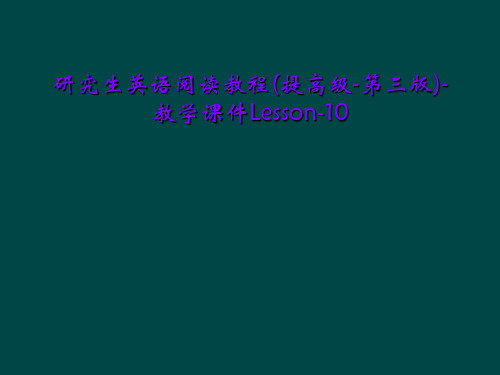
Background Information
and used logic and reasoning to support his points. By the Way, BTW: “St.” in this context means “Saint”, a holy and virtuous person. It sometimes is used in lower case, saint, to a Christian believer. – Not to be confused in other contexts with “Street,” as in Broadway St., Broadway Street.
14
Background Information
Sir Isaac Newton (1642-1727)
English physicist, mathematician, and natural philosopher, considered one of the most important scientists of all time. He formulated laws of universal gravitation and motion— laws that explain how objects move on Earth as well as through the heavens.
12
Background Information
Empedocles (490 BC?-430 BC) Greek philosopher, statesman, and poet.
13
Background Information
Karl Popper ( 1902-1994 ) Austrian-born British philosopher of science, known for his theory of scientific method and criticism of historical determinism.
u4新探索研究英语基础及视听说教程
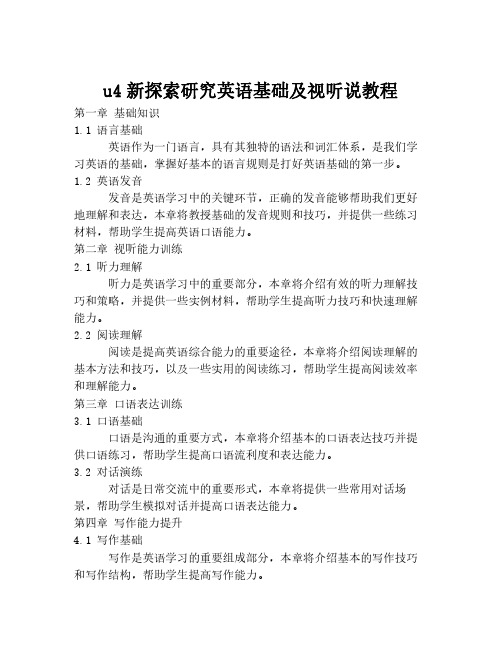
u4新探索研究英语基础及视听说教程第一章基础知识1.1语言基础英语作为一门语言,具有其独特的语法和词汇体系,是我们学习英语的基础,掌握好基本的语言规则是打好英语基础的第一步。
1.2英语发音发音是英语学习中的关键环节,正确的发音能够帮助我们更好地理解和表达,本章将教授基础的发音规则和技巧,并提供一些练习材料,帮助学生提高英语口语能力。
第二章视听能力训练2.1听力理解听力是英语学习中的重要部分,本章将介绍有效的听力理解技巧和策略,并提供一些实例材料,帮助学生提高听力技巧和快速理解能力。
2.2阅读理解阅读是提高英语综合能力的重要途径,本章将介绍阅读理解的基本方法和技巧,以及一些实用的阅读练习,帮助学生提高阅读效率和理解能力。
第三章口语表达训练3.1口语基础口语是沟通的重要方式,本章将介绍基本的口语表达技巧并提供口语练习,帮助学生提高口语流利度和表达能力。
3.2对话演练对话是日常交流中的重要形式,本章将提供一些常用对话场景,帮助学生模拟对话并提高口语表达能力。
第四章写作能力提升4.1写作基础写作是英语学习的重要组成部分,本章将介绍基本的写作技巧和写作结构,帮助学生提高写作能力。
4.2英语作文本章将提供一些写作题目,并教授写作方法和技巧,帮助学生培养良好的写作习惯和提高写作水平。
第五章高级阅读与听力5.1高级听力高级听力是英语学习中的难点之一,本章将提供一些高难度的听力材料,并教授听力策略,帮助学生突破听力壁垒。
5.2高级阅读高级阅读能力是研究英语的重要环节,本章将提供一些高级阅读材料,并指导学生如何理解和分析复杂的英文文本。
本教程旨在帮助学生全面提升英语基础知识和语言能力,通过系统的学习和实践,打好英语学习的根基,为进一步的学习和应用奠定基础。
注意:本文档仅供学习交流使用,严禁用于商业用途及未经授权的转载。
新探索研究生英语(提高级)读写教程u2
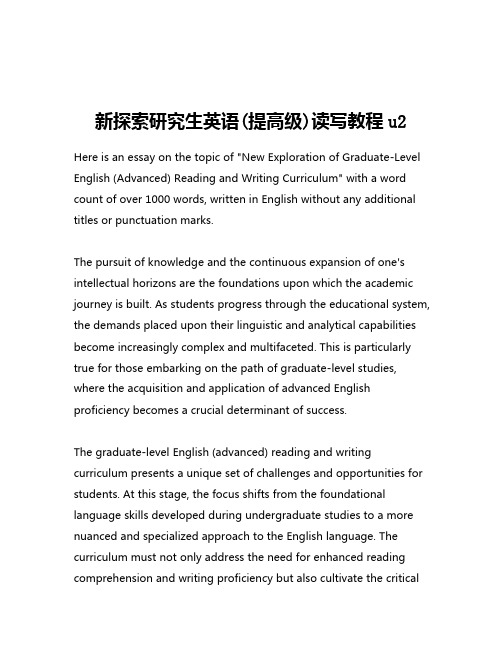
新探索研究生英语(提高级)读写教程u2Here is an essay on the topic of "New Exploration of Graduate-Level English (Advanced) Reading and Writing Curriculum" with a word count of over 1000 words, written in English without any additional titles or punctuation marks.The pursuit of knowledge and the continuous expansion of one's intellectual horizons are the foundations upon which the academic journey is built. As students progress through the educational system, the demands placed upon their linguistic and analytical capabilities become increasingly complex and multifaceted. This is particularly true for those embarking on the path of graduate-level studies, where the acquisition and application of advanced English proficiency becomes a crucial determinant of success.The graduate-level English (advanced) reading and writing curriculum presents a unique set of challenges and opportunities for students. At this stage, the focus shifts from the foundational language skills developed during undergraduate studies to a more nuanced and specialized approach to the English language. The curriculum must not only address the need for enhanced reading comprehension and writing proficiency but also cultivate the criticalthinking and research skills necessary for thriving in the rigorous academic environment.One of the primary objectives of the graduate-level English (advanced) curriculum is to equip students with the ability to engage with complex academic texts, both in terms of content and linguistic complexity. This involves developing strategies for efficient and effective reading, such as the ability to identify key ideas, analyze underlying arguments, and synthesize information from multiple sources. Additionally, students must learn to navigate the various genres of academic writing, including research papers, literature reviews, and scholarly articles, each with its own conventions and stylistic requirements.The curriculum must also place a strong emphasis on the development of advanced writing skills. At the graduate level, students are expected to produce well-structured, cohesive, and persuasive written work that demonstrates a deep understanding of the subject matter and a mastery of academic discourse. This entails not only the refinement of grammar, syntax, and vocabulary but also the cultivation of critical thinking and rhetorical skills. Students must learn to craft compelling arguments, effectively incorporate and cite sources, and communicate their ideas with clarity and precision.Moreover, the graduate-level English (advanced) curriculum shouldfoster the development of research skills. As students progress through their studies, they are often required to undertake independent research projects, which necessitates the ability to locate, evaluate, and synthesize relevant scholarly sources. This process involves not only navigating various information databases and library resources but also the ability to critically analyze and interpret research findings.To achieve these objectives, the curriculum must be designed with a balance of theoretical and practical components. Classroom instruction should provide students with a solid foundation in advanced English language concepts, such as discourse analysis, genre-specific writing conventions, and research methodologies. However, the curriculum should also incorporate ample opportunities for hands-on practice, including peer review, writing workshops, and collaborative research projects. This blend of theory and practice helps to ensure that students not only acquire the necessary knowledge but also develop the skills to apply it effectively in their academic and professional pursuits.Furthermore, the graduate-level English (advanced) curriculum should be adaptable and responsive to the evolving needs of students and the academic landscape. As the demands of higher education and the job market continue to shift, the curriculum must be regularly reviewed and updated to ensure that it remains relevantand effective. This may involve incorporating emerging technologies, interdisciplinary approaches, and innovative pedagogical strategies to enhance the learning experience and better prepare students for the challenges they will face in their future endeavors.In conclusion, the new exploration of the graduate-level English (advanced) reading and writing curriculum is a critical component of the academic journey. By cultivating advanced language proficiency, critical thinking skills, and research capabilities, this curriculum empowers students to navigate the complexities of graduate-level studies and beyond. Through a balanced approach of theoretical instruction and practical application, the curriculum can equip students with the necessary tools to excel in their academic pursuits, contribute to the advancement of knowledge, and ultimately, realize their full potential as scholars and leaders in their respective fields.。
新职业英语 视听说Unit 3 PPT
Listening 1-Task 1
Ⅱ Extensive Listening Bill Smith invites Susan Jones to attend a dinner party. Listen to the conversation and decide whether the following statements are true or false. Then write down the key words to support your answers.
Alice thinks Mr. Collins’ suggestion is a neat idea and solves all her problems.
Script
Listening 1-Task 2
Ⅲ Intensive Listening
Listen to the conversation again and decide whether the following statements are true or false. Then write down the key words to support your answers.
Listening 1-Task 1
Ⅰ Warming-up Suppose you’re going to invite your friends to dinner. Make some preparations before you send an invitation by filling in the following blanks.
The branch office directors will come to the party besides Susan and Bill. 5. How will Susan go to the party?
新探索研究生英语(基础级)读写教程课件u2
新探索研究生英语(基础级)读写教程课件u2Unit 2: Personal Growth and Development1. What are some common challenges that graduate students face in their personal growth and development?Some common challenges that graduate students face in their personal growth and development include time management, stress management, imposter syndrome, financial pressure, and maintaining a work-life balance.2. How can graduate students overcome these challenges?Graduate students can overcome these challenges by developing effective time management skills, practicingself-care and stress management techniques, seeking support from mentors or counselors, creating a budget and seeking financial aid if needed, and setting boundaries toprioritize their personal well-being.3. Can you provide some tips for graduate students to maintain a healthy work-life balance?Some tips for graduate students to maintain a healthy work-life balance include setting realistic goals and priorities, scheduling time for relaxation and hobbies, practicing mindfulness and self-care, seeking social support from friends and family, and learning to say no to excessive work demands.4. What are the benefits of personal growth and development for graduate students?The benefits of personal growth and development for graduate students include increased self-awareness andself-confidence, improved resilience and adaptability, enhanced interpersonal skills, better academic performance, and overall well-being.5. How can graduate students track their personal growth and development progress?Graduate students can track their personal growth and development progress by setting specific goals, keeping a journal to reflect on their experiences and insights, seeking feedback from mentors or peers, and regularly evaluating their achievements and areas for improvement.6. 中文回答:1. 研究生在个人成长和发展中面临的一些常见挑战有哪些?研究生在个人成长和发展中面临的一些常见挑战包括时间管理、压力管理、冒充综合征、经济压力和保持工作与生活的平衡。
新视野大学英语(第三版)视听说教程 B4U3 PPT
Sharing
4 Watch Part 2 and check the true statements.
√5 E
√6 F
5 She would travel more.
6 She would go out to see her friends more often.
Listening to the world
2 In your opinion, what are the benefits to society of giving people more free time or more holidays?
Listening to the world
Sharing
6 Work in pairs and discuss the questions.
The correct order is: a-d-g-e-b-f-c. A “niche holiday” refers to a holiday in which one can pursue a particular interest or hobby. It is usually targeted at certain types of people.
2 Watch Part 1 and fill in the blanks.
1) enjoy 2) free 3) music
4) internationally 5) festivals 6) spend your free time
Listening to the world
Sharing
3 Watch Part 2 and match the activities to the people.
新视野视听说第三版B2U3 ppt课件
Listening to the world
Sharing
4 Watch Part 2 and fill in the blanks.
Additional Notes
Robin Hood Festival
A festival that takes place for one week in August every year in Sherwood Forest, an ancient woodland in Nottinghamshire, England. The event celebrates the life and times of one of the most popular outlaws in the world: Robin Hood. Activities and entertainment include children’s theater, strolling players, jesters, jousting, and新视野视听说第三版B2U3 music.
2 Work in pairs and discuss the question:
2 Check (✔) the ones you have never done but long to have a try and give your reasons.
☐ 1 snow skiing
☐ 10 aerobics
The activities I have never done but long to have a try is 15.
I have always had an interest in yoga. Yoga is relaxing and invigorating. It makes you feel good at the end of a session. More importantly, it results in better health, more inner peace and more passion for life.
- 1、下载文档前请自行甄别文档内容的完整性,平台不提供额外的编辑、内容补充、找答案等附加服务。
- 2、"仅部分预览"的文档,不可在线预览部分如存在完整性等问题,可反馈申请退款(可完整预览的文档不适用该条件!)。
- 3、如文档侵犯您的权益,请联系客服反馈,我们会尽快为您处理(人工客服工作时间:9:00-18:30)。
新探索研究生英语(提高级)视听说
教程U3课件
课程介绍
该课程旨在帮助研究者提高研究生英语的视听说能力。
通过这门课程,研究者将能够进一步拓展英语听力、口语和阅读技巧,提高英语交流能力,并能够更好地应对研究生阶段的学术要求。
教学目标:
提高研究者的英语听力能力,培养对于不同语速、口音和语境的理解能力;
培养研究者的口语表达能力,使其能够流利而自信地进行英语口语交流;
提升研究者的阅读理解能力,培养综合分析和判断的能力;
增强研究者对于学术论文和研究文献的阅读理解和诠释能力。
教学内容:
涵盖了不同主题和语言难度的视听材料,包括采访、演讲、讨论等,以扩展研究者的听力范围和训练其语言理解能力;
提供口语训练环节,通过对话、演讲和辩论等活动,培养研究者的口语表达能力和思维逻辑能力;
阅读材料涵盖了各个学术领域的文献和文章,旨在提高研究者
的阅读理解能力和学术写作技巧。
研究该课程的重要性:
研究生阶段需要更高水平的英语能力,无论是进行研究、写作
还是与国际同行交流,良好的英语视听说能力都是必备的;
通过研究该课程,研究者将能够更好地适应研究生研究环境,
更有效地获取、理解并应用英文学术资源;
提高英语视听说能力将有助于研究者取得更好的学术成绩和提
升个人的职业竞争力。
在这门课程中,我们将为研究者提供丰富多样的视听说材料和
训练活动,帮助他们不断提高英语能力,为研究生研究和未来的学
术发展打下坚实的基础。
让我们一起开启这段研究生英语提高之旅!教学资源让我们一
起开启这段研究生英语提高之旅!教学资源
新探索研究生英语(提高级)视听说教程U3课件》的教学资
源丰富多样,包括教材、录音和视频资料,以及其他辅助教学资源。
这些资源对学生的研究和进步起着重要作用。
新探索研究生英语
(提高级)视听说教程U3课件》的教学资源丰富多样,包括教材、录音和视频资料,以及其他辅助教学资源。
这些资源对学生的研究
和进步起着重要作用。
教材是学生研究的核心内容,提供了结构化的知识和语言练。
《新探索研究生英语(提高级)视听说教程U3课件》的教材内容
丰富,涵盖了各种主题和语言技能。
学生通过教材的研究,可以扩
展词汇量,提高语法和语言运用能力。
录音和视频资料是提供给学生听力和口语练的重要资源。
这些
资料包括课本上的听力材料和配套的录音文件,以及相关主题的视
频素材。
学生可以通过听录音和观看视频,提高对于英语的听力理
解能力,并模仿其中的口语表达,提高口语表达能力。
除了教材和录音视频资料,还有其他辅助教学资源可以帮助学
生有效地研究。
例如,单词表、语法手册和练册可以作为学生复和
巩固所学知识的辅助材料。
此外,老师也可以提供额外的阅读材料、听力练和口语任务,以帮助学生更好地掌握课程内容。
学生可以通过充分利用这些教学资源,提高英语水平,增强听
说能力和语言运用能力。
同时,学生应该学会合理安排研究时间,
根据自己的研究需求有效地使用这些资源。
通过不断地使用这些教
学资源,学生可以更好地理解课程内容,提高自己的研究效果。
在《新探索研究生英语(提高级)视听说教
程U3课件》中,我们可以采用一些有效的教学
方法和策略来帮助学生提高他们的听力、口语和发音能力,同时提升他们的交流能力。
一、听说技巧和练方法:
合理设置听力练,包括听力材料的选择和难度的适应,并提供
相应的练题,帮助学生培养听力理解能力。
引导学生进行听写练,提高他们对听力材料的准确把握和记录
能力。
鼓励学生听录音并模仿,帮助他们提高听力和口语表达的配合
能力,并通过模仿来提升他们的发音准确性。
二、教学策略:
分组讨论:将学生分成小组,进行课堂讨论,让他们积极参与
和交流,提高他们的口语表达能力和思维逻辑能力。
模拟对话:进行模拟对话练,让学生在情境中进行实际交流,
帮助他们提高口语表达流畅性和语法准确性。
角色扮演:通过角色扮演的方式,让学生在不同角色中体验真
实的交流情境,锻炼他们的表达能力和语言运用能力。
通过采用以上教学方法和策略,学生可以更好地参与课堂活动,充分展示他们的英语听说能力,逐步提高他们的技能水平,为他们
在英语研究和实际应用中打下坚实的基础。
注意:本文按照要求撰写,内容尽力简洁明了,但不对具体教材中的方法和策略进行总结。
注意:本文按照要求撰写,内容尽力简洁明了,但不对具体教材中的方法和策略进行总结。
